
July 29

1858 Japan: US envoy Townsend Harris, after two years of negotiation, concludes his mission with the signing of The Treaty of Amity and Commerce Between the United States and Japan, better known as The Harris Treaty. Unfortunately, the Japanese will come to view it as another of a series of humiliating "unequal treaties" delineating "trading rights" for the barbarians.
[See: Countdown to Infamy: Timeline to Pearl Harbor.]1871 Birth: Rasputin (Gregory Efimovich), the mad Russian monk:
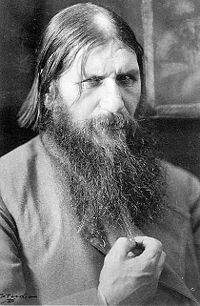
It is not clear what Rasputin really wanted. He was definitely a man who had two personalities, if not more. He desired holiness but was not cut out for the discipline of the monastery. He also desired the world and sex. With his life in view, it would appear that Rasputin tried combining both worlds. To some he was a priest, or holy man, while to others he was a politician, one to be petitioned to receive favors from. Usually most men in such a position are dangerous, but Rasputin on the whole seemed not to be dangerous
1883 Birth: Benito Mussolini in Predappio, northern central Italy:
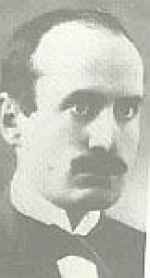
His father was a blacksmith. Employment prospects in the area were poor so in 1902 Mussolini moved to Switzerland, where he became involved in socialist politics. He returned to Italy in 1904, and worked as a journalist in the socialist press, but his support for Italy's entry into World War I led to his break with socialism. He was drafted into the Italian army in September 1915.
In March 1919, Mussolini formed the Fascist Party, galvanising the support of many unemployed war veterans. He organised them into armed squads known as Black Shirts, who terrorised their political opponents. In 1921, the Fascist Party was invited to join the coalition government.
By October 1922, Italy seemed to be slipping into political chaos. The Black Shirts marched on Rome, and Mussolini presented himself as the only man capable of restoring order. King Victor Emmanuel invited Mussolini to form a government. Mussolini gradually dismantled the institutions of democratic government and in 1925 made himself dictator, taking the title 'Il Duce'. He set about attempting to re-establish Italy as a great European power. The regime was held together by strong state control, and Mussolini's cult of personality.
In 1935, Mussolini invaded Abyssinia (now Ethiopia) and incorporated it into his new Italian Empire. He provided military support to Franco in the Spanish Civil War. Increasing co-operation with Nazi Germany culminated in the 1939 Pact of Steel. Influenced by Hitler, Mussolini began to introduce anti-Jewish legislation in Italy. His declaration of war on Britain and France in June 1940 exposed Italian military weakness and was followed by a series of defeats in North and East Africa and the Balkans.
In July 1943, Allied troops landed in Sicily. Mussolini was overthrown and imprisoned by his former colleagues in the Fascist government. In September, Italy signed an armistice with the Allies. The German army began the occupation of Italy and Mussolini was rescued by German commandos. He was installed as the leader of a new government, but had little power. As the Allies advanced northwards through Italy, Mussolini fled towards Switzerland. He was captured by Italian partisans and shot on 28 April 1945.
1899 First Hague Convention--among the first formal statements of the laws of war and war crimes in international law--is signed. [For further information, click here.]
1900 Death: King Umberto I of Italy is shot to death in Monza, Italy, by Gaetano Bresci, an Italian-born anarchist who resided in America before returning to his homeland to murder the king.
Crowned in 1878, King Umberto became increasingly authoritarian in the late 19th century. He enacted a program of suppression against the radical elements in Italian society, particularly members of the popular anarchist movements. [For further details, Click here.]
1900 Birth: Hermann Esser, in Roermoos, Bavaria:
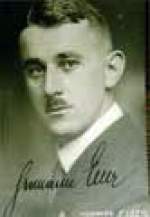
He did service in WWI and was for a short time a Social Democrat. Esser entered the party with Adolf Hitler in 1920, became the editor of the Nazi paper, Voelkischer Beobachter, and a Nazi member of the Reichstag. In the early history of the party, he was Hitler's de facto deputy.
Esser was an effective public speaker and was its first chief of propaganda. After the Beer Hall Putsch fiasco, he was influential in the reorganization of the party. From 1929 to 1933, he was the Nazi party floor leader in Munich's city council. Afterwards, he became a member of the Reichstag and Bavaria's minister of economics. In 1939 to the end of the war he served as the undersecretary for tourism in the Reich propaganda ministry.
He died in Munich in 1981.
1913 Birth: Erich Priebke, at Hennigsdorf, Brandenburg, Germany is a former SS Hauptsturmfuehrer of Nazi Germany:
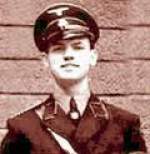
He participated in the massacres at the Ardeatine caves in Rome in Italy on March 24, 1944. Three hundred and thirty-five Italian civilians were killed there as revenge after a partisan Communist group had killed 33 German soldiers. Priebke was one of those who stood responsible for this mass execution.
1914 Countdown to World War I: Kaiser Wilhelm of Germany and Czar Nicholas of Russia exchange telegrams:

In the early hours of July 29, 1914, Czar Nicholas II of Russia and his first cousin, Kaiser Wilhelm II of Germany, begin a frantic exchange of telegrams regarding the newly erupted war in the Balkan region and the possibility of its escalation into a general European war.
One day prior, Austria-Hungary had declared war on Serbia, one month after the assassination in Sarajevo of Austrian Archduke Franz Ferdinand and his wife by a Serbian nationalist. In the wake of the killings, Germany had promised Austria-Hungary its unconditional support in whatever punitive action it chose to take towards Serbia, regardless of whether or not Serbia's powerful ally, Russia, stepped into the conflict. By the time an ultimatum from Vienna to Serbia was rejected on July 25, Russia, defying Austro-German expectations, had already ordered preliminary mobilization to begin, believing that Berlin was using the assassination crisis as a pretext to launch a war to shore up its power in the Balkans.
The relationship between Nicholas and Wilhelm, two grandsons of Britain's Queen Victoria, had long been a rocky one. Though Wilhelm described himself as Victoria's favorite grandson, the great queen in turn warned Nicholas to be careful of Wilhelm's "mischievous and unstraight-forward proceedings." Victoria did not invite the kaiser, who she described to her prime minister as "a hot-headed, conceited, and wrong-headed young man," to her Diamond Jubilee celebration in 1897, nor her 80th birthday two years later. Czar Nicholas himself commented in 1902 after a meeting with Wilhelm: "He's raving mad!" Now, however, the two cousins stood at the center of the crisis that would soon escalate into the First World War. [For further details, Click here.] Excerpts from telegrams sent, in the original English: The original source for the telegrams is The Kaiser's Letters to the Tsar, copied from the government archives in Petrograd, and brought from Russia, edited by Isaac Don Levine, published by Hodder and Stoughton (London, 1920)
Tsar to Kaiser: Am glad you are back. In this serious moment, I appeal to you to help me. An ignoble war has been declared to a weak country. The indignation in Russia shared fully by me is enormous. I foresee that very soon I shall be overwhelmed by the pressure forced upon me and be forced to take extreme measures which will lead to war. To try and avoid such a calamity as a European war I beg you in the name of our old friendship to do what you can to stop your allies from going too far.
Kaiser to Tsar: It is with the gravest concern that I hear of the impression which the action of Austria against Serbia is creating in your country. The unscrupulous agitation that has been going on in Serbia for years has resulted in the outrageous crime, to which Archduke Francis Ferdinand fell a victim. The spirit that led Serbians to murder their own king and his wife still dominates the country. You will doubtless agree with me that we both, you and me, have a common interest as well as all Sovereigns to insist that all the persons morally responsible for the dastardly murder should receive their deserved punishment. In this case politics plays no part at all. On the other hand, I fully understand how difficult it is for you and your Government to face the drift of your public opinion. Therefore, with regard to the hearty and tender friendship which binds us both from long ago with firm ties, I am exerting my utmost influence to induce the Austrians to deal straightly to arrive to a satisfactory understanding with you. I confidently hope that you will help me in my efforts to smooth over difficulties that may still arise. Your very sincere and devoted friend and cousin Willy.
Kaiser to Tsar: I received your telegram and share your wish that peace should be maintained. But as I told you in my first telegram, I cannot consider Austria's action against Serbia an "ignoble" war. Austria knows by experience that Serbian promises on paper are wholly unreliable. I understand its action must be judged as trending to get full guarantee that the Serbian promises shall become real facts. This my reasoning is borne out by the statement of the Austrian cabinet that Austria does not want to make any territorial conquests at the expense of Serbia. I therefore suggest that it would be quite possible for Russia to remain a spectator of the Austro-Serbian conflict without involving Europe in the most horrible war she ever witnessed. I think a direct understanding between your Government and Vienna possible and desirable, and as I already telegraphed to you, my Government is continuing its exercises to promote it. Of course military measures on the part of Russia would be looked upon by Austria as a calamity we both wish to avoid and jeopardize my position as mediator which I readily accepted on your appeal to my friendship and my help. Willy
Tsar to Kaiser: Thanks for your telegram conciliatory and friendly. Whereas official message presented today by your ambassador to my minister was conveyed in a very different tone. Beg you to explain this divergency! It would be right to give over the Austro-Serbian problem to the Hague conference. Trust in your wisdom and friendship. Your loving Nicky.
Austrian forces invade Serbia and begin an artillery bombardment of Belgrade, the Serbian capital.
Russia mobilizes its troops near the Austrian border:
The Russian Army of World War One has become notorious for its reputation as a large, ill-equipped force, yet in 1914, Russia's Imperial Troops were actually well trained and equipped. The real problem with the Russian Army lay in its inadequate transportation infrastructure, which was not able to supply and maintain Russian field formations at wartime establishments. As far as equipment was concerned, the average Russian soldier in the 1st and 2nd Line had sidearms, rifles and machine guns equal to his German counterparts.

1915 World War I: List Regiment: Gefreiter Adolf Hitler's 16 Reserve Infantry Regiment continue to occupy a position at Fromelles—pictured above in a drawing by Hitler—on a level field with water channels, willow trees and willow stalks; in the distance towards the enemy lines lies an insignificant wood with barbed wire entanglements. Under the direction of their defense-minded commander, Lieutenant General Gustav Scanzoni von Lichtenfels, the regiment works ceaselessly day and night to further fortify their position at Fromelles while fighting off repeated assaults by the enemy. [For further details, Click here.]
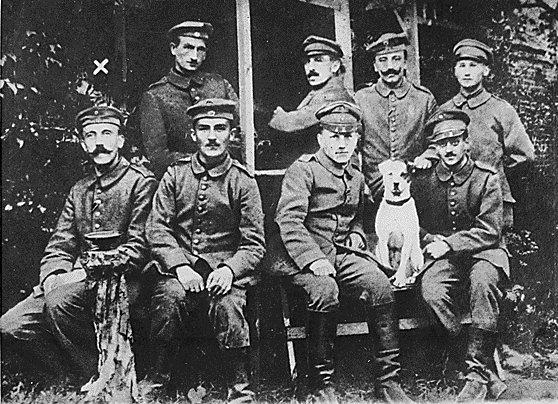
1916 World War I: List Regiment: Gefreiter Adolf Hitler endures trench warfare in Flanders (Artois) with 3 Company, 16 Reserve Infantry Regiment [List Regiment]. [For further details, Click here.]
1917 World War I:List Regiment (July 22-August 3): Dispatch Runner Gefreiter Adolf Hitler serves at the front with 3 Company, 16 Bavarian Reserve Infantry Regiment during Phase 2 operations in Flanders. Most of their time in the trenches gas masks are worn, while English bombers and tanks—a new terror witnessed for the very first time by most—attempt to advance over a long front through seas of mud. [For further details, Click here.]
1918 World War I: List Regiment (July 20-August 4):Gefreiter Adolf Hitler's 16th RIR continue building a new line of defenses on the site of the failed Second Battle of the Marne. [For further details, Click here.]
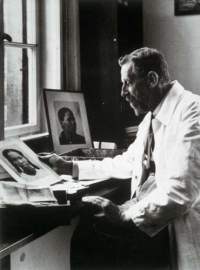
1933 Holocaust: Various:
Professor Fischer—recently elected as Rector of the University of Berlin—in which capacity he is responsible for signing his Jewish colleagues' dismissal notices, says in his inaugural address:
The new leadership, having only just taken over the reins of power, is deliberately and forcefully intervening in the course of history and in the life of the nation, precisely where this intervention is most urgently, most decisively, and most immediately needed. To be sure, this need can only be perceived by those who are able to see and to think within a biological framework, but it is understood by these people to be a matter of the gravest and most weighty concern. This intervention can be characterized as a biological population policy, biological in this context signifying the safeguarding by the state of our hereditary endowment and our race, as opposed to the unharnessed processes of heredity, selection, and elimination." (THP)
Germany revokes the citizenship of naturalized eastern European Jews:
Jews were identified with political subversion and Communism in particular...this sentiment was by no means a Nazi invention, and had been written about in public by Winston Churchill and a host of others including Henry Ford in America; the political subversion of which Jews were accused ranged from the fantastic (the Protocols of Zion) to the promotion of pornography, racial mixing, degenerate art ("modern art") and other issues identified as problematic by the Nazis.
1937 Otto Rahn makes a second expedition to Montsegur:

He became particularly intrigued by the mention of the Holy Grail being concealed, according to Parzifal, in the Holy mountain of Montsalvat. This was significant, especially when Rahn discovered that the Cathar stronghold of Montsegur boasted a nearby gigantic cave known as Montsalvat. He was at least intrigued enough to devote much time and energy in checking out the coincidence.
1939 Various:
German Foreign Office to the German Ambassador in the USSR (Schulenburg):
On the evening of the 26th of this month Schnurre had a detailed discussion with Astakhov and Babarin, the content of which is reported in the enclosed memorandum. Astakhov's answer indicates that a detailed report from him is already available in Moscow. At the end Astakhov asked whether we would maintain similar opinions if a prominent Soviet representative were to discuss these questions with a prominent German representative. Schnurre answered this question essentially in the affirmative. It would be important for us to know whether the statements made to Astakhov and Babarin have found any response in Moscow. If you see the opportunity of arranging a new talk with Molotov, I request that you sound him out in this sense and that, should the occasion arise, you use the line of thought of the memorandum. If it should develop that Molotov abandons the reserve thus far maintained by him, you can advance another step in your presentation and state somewhat more precisely what was expressed generally in the memorandum. This concerns particularly the Polish question. In any development of the Polish question, either in a peaceful manner as we desire it or in any other way that is forced upon us, we would be prepared to safeguard all Soviet interests and to reach an understanding with the Moscow Government. If the talk proceeds positively in the Baltic question too, the idea could be advanced that we will adjust our stand with regard to the Baltic in such a manner as to respect the vital Soviet interests in the Baltic.
Holocaust: Jews in Slovakia are forbidden to live in rural areas.
1940 World War II: Various:
Sealion: A German memorandum issued by the OKM states that an Invasion of Great Britain will not be possible until the second half of September 1940, and that the prospects for such an invasion seem doubtful.
[See: What Were Adolf Hitler's Major Blunders?]Holocaust: German Jews are forbidden to have telephones in their homes. (THP)
1941 Various:
Church and State: Army Bishop Rarkowski issues a pastoral letter to the German armed forces describing Germany as "the savior and champion of Europe." We know he added, that this war against Russia is waged by us as "a European Crusade," a task similar to that fulfilled in earlier times by the Teutonic knights. (THP)
Resistance: The Germans execute 122 "Communists and Jews" for resistance in Serbia. (THP)
1942 World War II: Various:
Barbarossa: German troops take Proletarskaya and establish a bridgehead over the Manych River in the Caucasus region.

Holocaust: Eduard Schulte (1891-1966) was a prominent German industrialist and secret anti-Nazi who leaked the first report to the west that the Nazis intended to murder all Jews in Europe.
Once the war broke out, Schulte decided to pass on information to the Allies in the hope that it might hasten Hitler's defeat. Traveling frequently from Germany to Switzerland, Schulte regularly served as an informant for Swiss and Polish intelligence services, which had contact with the British and American intelligence services. Yet Schulte's most famous contribution had little to do with the conduct of the war.
In late July 1942, Schulte told his business associate in Zurich—Isidor Koppelmann—that he had obtained information that the Nazi regime intended to murder all the Jews in Europe, possibly through the use of prussic acid (the poison gas which was actually used at the Auschwitz-Birkenau extermination camp). Schulte wanted to pass the information to leading Jewish organizations in the United States and to the Allied governments, which he hoped could forestall the massacre.
Koppelmann contacted Benjamin Sagalowitz, who ran an information bureau for the Jewish communities of Switzerland. Sagalowitz quickly reached Gerhart Riegner, representative of the World Jewish Congress. On August 8, 1942, Riegner presented his report to the British and American legations in Geneva. Since private cable traffic from Switzerland was not possible, Riegner requested that the information be forward through diplomatic channels to the respective governments and to Rabbi Stephen Wise, the president of the World Jewish Congress based in New York. The resulting cables got through only with difficulty and some delay.
1943 World War II: Various:
Allied bombers again hit Hamburg by day and night:
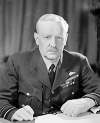
Arthur 'Bomber' Harris: No air raid ever known before had been so terrible as that which Hamburg had endured; the second largest city in Germany, with a population of nearly 2,000,000, had been wiped out in three nights. And at the same time the whole system of air defence, carefully built up, at the expense of all the other battle fronts in which the Germans were fighting, over a period of years, had been thrown into utter confusion; the night fighters, it appeared, would in future be powerless to detect the bombers in the dark, and the guns and searchlights would be altogether insufficient.
German report on the firestorm in Hamburg on 24th July, 1943:
Coal and coke supplies stored for the winter in many houses caught fire and could only be extinguished weeks later. Essential services were severely damaged and telephone services were cut early in the attack. Dockyards and industrial installations were severely hit. At mid-day next day there was still a gigantic, dense cloud of smoke and dust hovering over the city which, despite the clear sky, prevented the sun from penetrating through. Despite employment of all available force, big fires could not be prevented from flaring up again and again.
The alternative dropping of blockbusters (4000 Ib. high capacity bombs) high explosives, and incendiaries, made fire-fighting impossible, small fires united into conflagrations in the shortest time and these in turn led to the fire storms. To comprehend these one can only analyse them from a physical, meteorological angle. Through the union of a number of fires, the air gets so hot that on account of its decreasing specific weight, it receives a terrific momentum, which in its turn causes other surrounding air to be sucked towards the centre. By that suction, combined with the enormous difference in temperature (600-1000 degrees centigrade) tempests are caused which go beyond their meteorological counterparts (20-30 centigrade). In a built-up area the suction could not follow its shortest course, but the overheated air stormed through the street with immense force taking along not only sparks but burning timber and roof beams, so spreading the fire farther and farther, developing in a short time into a fire typhoon such as was never before witnessed, against which every human resistance was quite useless.
Italy: Fighting continues for the Island of Sicily:

Meanwhile, the 1st Infantry Division pushed its way eastward against stiffening German opposition, capturing Nicosia on the 28th before moving on to Troina. Patton planned to take the exhausted 1st Division out of the line once Troina fell. The mountain village, however, would prove to be the unit's toughest battle, as well as one of the most difficult fights of the entire Sicily Campaign. Troina constituted one of the main anchors of the Etna Line and was defended by the 15th Panzer Grenadier Division and elements of the Italian Aosta Division. The Axis forces were deeply entrenched in hills that both dominated the approaches to the town and were difficult to outflank. The barren landscape, almost devoid of cover, made advancing American soldiers easy targets.
1944 World War II: Various:
Radio Moscow urges the inhabitants of Warsaw to revolt:
They (the Germans) will expose the city to ruin and its inhabitants to death. They will try to take away all the most precious possessions and turn into dust all that they have to leave behind. It is, therefore, a hundred times more necessary than ever to remember that in the flood of Hitlerite destruction all is lost that is not saved by active effort; that by direct, active struggle in the streets of Warsaw, in its houses, factories and stores, we not only hasten the moment of final liberation, but also save a Nation's property and the lives of our brothers.
Baltics: Fighting heavy defensive battles in Estonia and Latvia, Armeegruppe Nord is cut off as a result of the Soviets capturing Riga and advancing to the Baltic coast, creating the infamous Kurland pocket.
Brest-Litovsk recaptured by the Red Army.
Stuttgart: the last of a series of RAF bombing raids takes place, killing 900 and leaving 100,000 homeless.
Death march: The Germans begin a "death march" evacuation of 3,250 slave laborers from Warsaw. (THP)
1945 World War II: War in the Pacific: Japanese warships sink the American cruiser USS Indianapolis, killing 883 seamen in the worst loss in the history of the US navy.
As a prelude to a proposed invasion of the Japanese mainland, scheduled for 1 November, US forces bombed the Japanese home islands from sea and air, as well as blowing Japanese warships out of the water. The end was near for Imperial Japan, but it was determined to go down fighting. Just before midnight of the 29th, the Indianapolis, an American cruiser that was the flagship of the Fifth Fleet, was on its way, unescorted, to Guam, then Okinawa. It never made it. It was torpedoed by a Japanese submarine. Interestingly, the submarine was commanded by a lieutenant who had also participated in the Pearl Harbor invasion. There were 1,196 crewmen onboard the Indianapolis; over 350 died upon impact of the torpedo or went down with the ship. More than 800 fell into the Pacific. Of those, approximately 50 died that first night in the water from injuries suffered in the torpedo explosion; the remaining seamen were left to flounder in the Pacific, fend off sharks, drink sea water (which drove some insane), and wait to be rescued. Because there was no time for a distress signal before the Indianapolis went down, it was 84 hours before help arrived. This was despite the fact that American naval headquarters had intercepted a message on 30 July from the Japanese submarine commander responsible for sinking the Indianapolis , describing the type of ship sunk and its location. The Americans assumed it was an exaggerated boast and didn't bother to follow up. Only 318 survived; the rest were eaten by sharks or drowned. The Indianapolis 's commander, Captain Charles McVay, was the only officer ever to be court-martialed for the loss of a ship during wartime in the history of the US Navy. Had the attack happened only three days earlier, the Indianapolis would have been sunk carrying special cargo, the atom bomb, which it delivered to Tinian Island, northeast of Guam, for scientists to assemble.
1946 Nuremberg Tribunal: The Prosecution continues its summation in the Major War Criminals Trial:
M. Auguste Champetier De Ribes (Chief Prosecutor for the French Republic): On presenting the final address of the French Public Prosecutor, I beg the Tribunal to permit me to express the admiration and the gratitude of my country for the objectivity and calm with which these proceedings have been conducted. In the course of the last 9 months the events of more than 15 years of history have been evoked at this bar. Germany's archives, those of them that the Nazis were unable to burn before their defeat, have yielded up their secrets. We have heard numerous witnesses, whose recollections would have been lost to history but for the present Trial.
All the facts have been presented with strict objectivity, leaving no room for passion nor even for sensibility. The Tribunal have excluded from the proceedings everything that, in their opinion, seemed insufficiently proved, everything that might have appeared to be dictated by a-spirit of vengeance. For the chief concern of this Trial is above all that of historical truth.
Thanks to it, the historian of the future, as well as the chronicler of today, will know the truth of the political, diplomatic, and military events of the most tragic period of our history; he will know the crimes of Nazism as well as the irresolution, the weaknesses, the omissions of the peace-loving democracies.
He will know that the work of twenty centuries of a civilization, which believed itself eternal, was almost destroyed by the return of ancient barbarism in a new guise, all the more brutal because more scientific.
He will know that the progress of mechanical science, modern means of propaganda, and the most devilish practices of a police which defied the most elementary rules of humanity, enabled a small minority of criminals within a few years to distort the collective conscience of a great people, and to transform the nation described by Dr. Sauter at the conclusion of his speech in defense of von Schirach, as loyal, upright, and full of virtue, into that of Hitler, Himmler, and Goebbels-to mention only those of them who are dead. He will know that the real crime of these men was the conception of the gigantic plan of world domination and the attempt to realize it by every possible means. By every possible means, that is of course, by the breaking of pledges and by unleashing the worst of all wars of aggression. but, above all, by the scientific and systematic extermination of millions of human beings and more especially of certain national or religious groups whose existence hampered the hegemony of the Germanic race. This is a crime so monstrous, so undreamt of in history throughout the Christian era up to the birth of Hitlerism, that the term "genocide" has had to be coined to define it and an accumulation of documents and testimonies has been needed to make it credible.
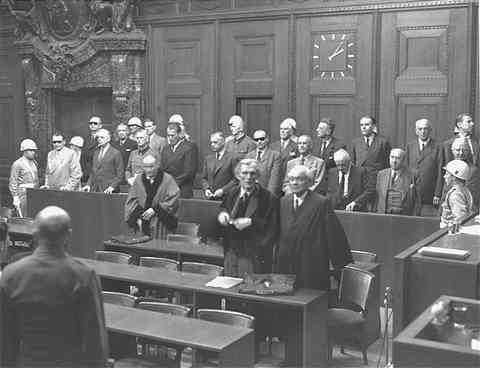
The defendants have been active in widely differing spheres. As politicians, diplomats, soldiers, sailors, economists, financiers, jurists, or propagandists, they represent practically every form of liberal activity. We recognize unhesitatingly, however, the tie that binds them together. They have all put the best-or the worst-of themselves at the service of the Hitlerite State. To a certain extent they represent the brains of that State; but they themselves were not the whole brain. Nevertheless, no one can doubt that they were an important part of it. They conceived the policy of that State. They wanted to transform their thoughts into action and all contributed in almost the same degree toward its realization. This is true, no matter whether it applies to Hess or Goering, professional politicians who admit never having practiced any other profession but that of agitator or statesman, or to Ribbentrop, Neurath, Papen, the diplomats of the regime, or to Keitel, Jodl, Doenitz, or Raeder, the fighting men, to Rosenberg, Streicher, Frank, or Frick, the inventors-if that term can be applied to them-of the ideology of the system, to Schacht and Funk, the financiers without whom the system would have gone bankrupt and collapsed in the resulting inflation before it could rearm, to jurists like Frank, to publicists and propagandists like Fritzsche and-again-Streicher, devoted to the dissemination of the common idea, or to technicians like Speer or Sauckel, without whom the idea could never have been translated into action as it has been, to policemen such as Kaltenbrunner who destroyed morale by terror, to ordinary Gauleiters like Seyss Inquart, Schirach, or-again-Sauckel, to administrators and high-ranking officials as well as politicians, who gave definite shape to the common policy conceived by the whole state and Party machine.
I know very well that the shadow of those who are absent looms over this machine, and today's defendants are perpetually reminding us of them: "Hitler wanted this, Himmler wanted this, Bormann wanted this." They say: "I only obeyed," and their defense counsels outdid them. Hitler, the monstrous tyrant, the fanatic visionary, imposing his will with an irresistible magnetic power-this is too simple; this is too sweeping. No man is entirely unreceptive to suggestion, insinuation, and influence; and Hitler escaped that law no more than any other man. We have had irrefutable proof of this in all the glimpses afforded us by these proceedings of the struggle for influence which went on in the "great man's" entourage.
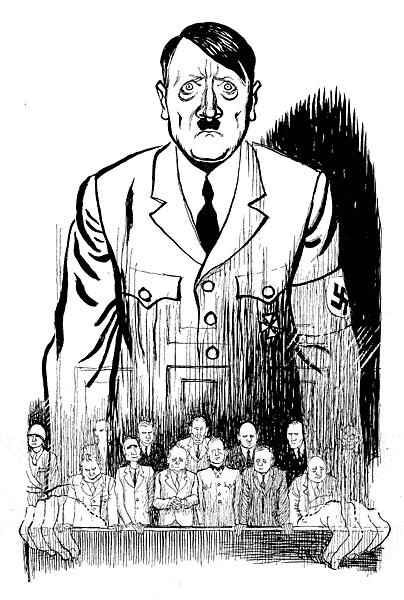
In nearly every society there exists a certain hierarchy among its members. Very often the head of a criminal gang usurps unlimited power over the other members, even the right of life and death, but it never occurred to any lawyer in the world to deny the existence of a criminal society merely because its participants were not equal among themselves and one of them had power over the others.
It is, at any rate, strange to deny the existence of the conspiracy in the present case because of the fact that enormous personal power was vested in the hands of the leader Hitler. In the same way the existence of the conspiracy does not preclude but, per contra, implies a definite distribution of the parts played by the participants of the criminal group in pursuance of the common criminal aim: One directs all the criminal activities, the other is in charge of questions of ideological training, the third prepares the army, the fourth organizes the war industry, the fifth carries on diplomatic preparations, et cetera. Therefore, the fascist conspiracy does not cease to be a conspiracy, but is one which presents special danger, since the entire machinery of the government and enormous resources of men and material are in the hands of the conspirators. In the hands of the international criminals, in the hands of Goering, Keitel, and the other defendants countless people became instruments of most grievous crimes. This is the reason why specific features which distinguish the conspirators of fascist Germany from any other gang only lend it a specially dangerous character without changing in any way the legal nature of the conspiracy. This completes the analysis of the legal arguments of the Defense, which were examined in detail by my honorable colleagues. As you have seen, Your Honors, the arguments of the Defense were found to be inconsistent and incapable of rebutting the charges.
1956 Space race: Presidential Press Secretary James C. Hagerty issues a statement from the White House:
On behalf of the President [Eisenhower], I am now announcing that the President has approved plans by this country for going ahead with the launching of small unmanned earth-circling satellites, as part of the United States participation in the International Geophysical Year, which takes place between July 1957 and December 1958. This program will, for the first time in history, enable scientists throughout the world to make sustained observations in the regions beyond the earth's atmosphere. The President expressed personal gratification that the American program will provide scientists of all nations, this important and unique opportunity for the advancement of science.
[See: Wunderwaffen: Hitler's Deception and the History of Rocketry.]1958 NASA created:
On this day in 1958, the U.S. Congress passes legislation establishing the National Aeronautics and Space Administration (NASA), a civilian agency responsible for coordinating America's activities in space. NASA has since sponsored space expeditions, both human and mechanical, that have yielded vital information about the solar system and universe. It has also launched numerous earth-orbiting satellites that have been instrumental in everything from weather forecasting to navigation to global communications. [For further details, Click here.]
1974 Death: Erich Kaestner, one of the most famous German authors and children's writers of the 20th century. He wrote many long time bestseller books for children like Emil and the Detectives and The Little Man and the Little Miss, but he was also a political author. He held pacifist ideals, and wrote for children because of his belief in the renewing powers of each generation of youth. He was opposed to the Nazi regime in Germany, and therefore his books were burnt under this regime.
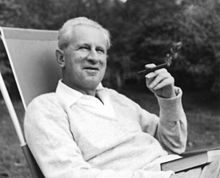
1979 Death: Herbert Marcuse: prominent German-American philosopher and sociologist of Jewish descent, and a member of the Frankfurt School. During World War II, Marcuse first worked for the U.S. Office of War Information (OWI) on anti-Nazi propaganda projects. In 1943 he transferred to the Office of Strategic Services (OSS). His work for the OSS involved research on Nazi Germany and denazification. After the dissolution of the OSS in 1945, Marcuse was employed by the US Department of State until 1951 as head of the Central European bureau, retiring after the death of his wife.
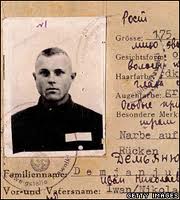
1993 War Crimes: The Israeli Supreme Court acquits retired Ohio auto-worker John Demjanjuk of being Nazi death camp guard 'Ivan the Terrible' and he is set free. He returns to the USA until deported to Germany in 2009.
In 1993, five years after his trial, Demjanjuk was freed by Israeli supreme court judges who ruled there was insufficient evidence to show that he had been Ivan the Terrible. Nevertheless, their judgment indicated that although they could not find him guilty beyond reasonable doubt, they also doubted that he was innocent.
Documentary evidence seemed conclusively to identify Demjanjuk as a graduate of Trawniki, an SS training school in Poland. From there he had been posted to the death camp at Sobibor; a scar left by a surgically-removed SS tattoo indicating his blood group, along with an account of his activities during the Second World War — riddled with contradictions and sinister coincidences — appeared to confirm this.
In December 2009 Demjanjuk, 89 years old and deeply sick, went on trial again, this time in Munich, where he was wheeled into court each day strapped to a gurney. In a bizarre piece of judicial theatre, he lay there, apparently groaning in pain, as witnesses (many of them descendants of Sobibor victims) gave their testimony.
In May 2011 the German court convicted him of helping to murder almost 30,000 Jews at Sobibor, amounting to the number killed during the period when he was a guard there. A total of a quarter of a million people were murdered at the death camp. “The court is convinced that the defendant served as a guard at Sobibor from March 27 1943 to mid-September 1943,” said presiding Judge Ralph Alt, sentencing him to five years in jail. “As guard he took part in the murder of at least 28,000 people.” [For further details, Click here.]
Edited by Levi Bookin (Copy editor)
levi.bookin@gmail.com



Click to join 3rdReichStudies



Disclaimer: This site includes diverse and controversial materials—such as excerpts from the writings of racists and anti-Semites—so that its readers can learn the nature and extent of hate and anti-Semitic discourse. It is our sincere belief that only the informed citizen can prevail over the ignorance of Racialist "thought." Far from approving these writings, this site condemns racism in all of its forms and manifestations.
Fair Use Notice: This site may contain copyrighted material the use of which has not always been specifically authorized by the copyright owner. We are making such material available in our efforts to advance understanding of historical, political, human rights, economic, democracy, scientific, environmental, and social justice issues, etc. We believe this constitutes a "fair use" of any such copyrighted material as provided for in section 107 of the US Copyright Law. In accordance with Title 17 U.S.C. Section 107, the material on this site is distributed without profit to those who have expressed a prior interest in receiving the included information for research and educational purposes. If you wish to use copyrighted material from this site for purposes of your own that go beyond 'fair use', you must obtain permission from the copyright owner.
Please Note: The list-owner and moderators of 3rdReichStudies are not responsible for, and do not necessarily approve of, the random ads placed on our pages by our web server. They are, unfortunately, the price one pays for a 'free' website.